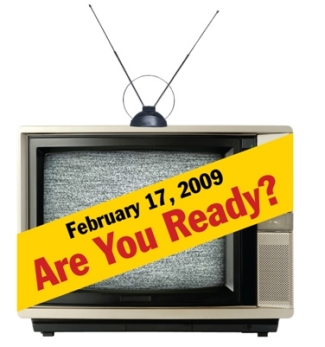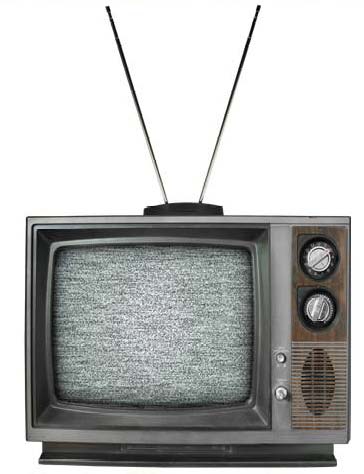
 What Is The Digital TV (DTV) Transition? What Is The Digital TV (DTV) Transition?
Currently, many over-the-air stations are broadcasting in both
analog and digital TV formats. After February 17, 2009, full–power TV
stations will broadcast only in digital. The DTV transition will affect
those who watch free over-the-air television (through a rooftop antenna or
“rabbit ears”). If you watch over-the-air programs on an analog TV, you
must take action before February 17, 2009.
 Why Are Broadcast Stations Switching to Digital? Why Are Broadcast Stations Switching to Digital?
Federal law requires the switch, which will free up the airwaves for police,
fire, and emergency rescue communications, allow broadcasters to offer
programming with better picture and sound quality and offer more programming
choices, and allow for advanced wireless services.
 What Should I Do to Be Ready? What Should I Do to Be Ready?
You have three choices:
 Connect your analog TV to a digital-to-analog converter box.
Digital-to-analog converter boxes are in stores and have a one-time cost of
$40-$70. To help you pay for the boxes, the U.S. Government is offering two
$40 coupons per household. (Please note that these coupons will expire 90
days after mailing). For more information on the coupons, visit
www.DTV2009.gov, or call 1-888-388-2009 (voice) or 1-877-530-2634 (TTY).
Plus, you should not need a new antenna if you get good quality reception on
analog channels 2-51 with your existing antenna. Or Connect your analog TV to a digital-to-analog converter box.
Digital-to-analog converter boxes are in stores and have a one-time cost of
$40-$70. To help you pay for the boxes, the U.S. Government is offering two
$40 coupons per household. (Please note that these coupons will expire 90
days after mailing). For more information on the coupons, visit
www.DTV2009.gov, or call 1-888-388-2009 (voice) or 1-877-530-2634 (TTY).
Plus, you should not need a new antenna if you get good quality reception on
analog channels 2-51 with your existing antenna. Or
 Buy a digital television (a TV with a built-in digital tuner).
You do not need a High Definition TV (HDTV) to watch digital
broadcast television. You only need a digital TV (or an analog TV
connected to a digital-to-analog converter box). Plus, you should not need a
new antenna if you get good quality reception on analog channels 2-51 with
your existing antenna. Or Buy a digital television (a TV with a built-in digital tuner).
You do not need a High Definition TV (HDTV) to watch digital
broadcast television. You only need a digital TV (or an analog TV
connected to a digital-to-analog converter box). Plus, you should not need a
new antenna if you get good quality reception on analog channels 2-51 with
your existing antenna. Or
 Subscribe to a paid TV service.
If your TV set receives local broadcast stations through a paid provider
such as cable or satellite TV, it is already prepared for the DTV
transition. Cable companies are not required to transition or switch
any of their channels to digital. However, if you have an analog TV that
does not receive local broadcast stations through your paid provider,
you will need a digital-to-analog converter box to watch digital broadcasts
on that TV. Subscribe to a paid TV service.
If your TV set receives local broadcast stations through a paid provider
such as cable or satellite TV, it is already prepared for the DTV
transition. Cable companies are not required to transition or switch
any of their channels to digital. However, if you have an analog TV that
does not receive local broadcast stations through your paid provider,
you will need a digital-to-analog converter box to watch digital broadcasts
on that TV.
For More Information:


 How can I extend the useful life of my analog TV? How can I extend the useful life of my analog TV?

If you have an analog TV set and receive free over the air
broadcasts, the U.S. Environmental Protection Agency encourages you to
extend the life of your TV by connecting it to a digital-to-analog
converter box or subscribing to a paid TV service. When buying a
digital-to-analog converter box, look for one with the ENERGY STAR label.
Converter boxes that are ENERGY STAR-qualified use less energy than
conventional converter boxes. If all of the digital-to-analog
 converter
boxes sold in the U.S. met the ENERGY STAR specification, we would save
823 million kilowatt-hours every year. A list of ENERGY STAR qualified
models can be found at
www.energystar.gov/products (select
Digital-to-Analog Converter Boxes). converter
boxes sold in the U.S. met the ENERGY STAR specification, we would save
823 million kilowatt-hours every year. A list of ENERGY STAR qualified
models can be found at
www.energystar.gov/products (select
Digital-to-Analog Converter Boxes).
 If I no longer want my old TV, what should I do with it? If I no longer want my old TV, what should I do with it?
Recycle it! If you decide to buy a new digital TV and
no longer want your old analog TV, look for opportunities to recycle it.
Recycling TVs recovers valuable materials from the circuit boards, metal
wiring, leaded glass, and plastics. Call your local household hazardous
waste collection and recycling program to find out whether they will be
sponsoring an upcoming event to recycle TVs and other electronics. You can
also check out the following Web sites to find a recycling program near
you:
Identifying resources and locations for electronics
recycling does not constitute EPA’s endorsement of the services.
Earth 911
www.earth911.com/electronics Earth 911’s
zip-code based search engine enables you to find recycling and reuse
options in your community for a variety of products.
National Recycling Coalition
www.nrc-recycle.org/localresources.aspx
This page provides links to state recycling resources. Many communities
have special collection and recycling days that are highlighted on their
Web sites.
My Green Electronics
www.mygreenelectronics.org
On
this Consumer Electronics Association site, you can learn more about
purchasing “green” electronic products and search for recycling
opportunities.
For many working electronic products, donation is a
good option because it facilitates reuse and extends the product life.
However, with the switch to digital broadcasting, many charitable
organizations may no longer be accepting analog TVs. Please check with the
organization before you drop off your analog TV.

|

